Project Description
My life in weeks
Published: April 10, 2016
I turned 25 in January. If you’re older than me, 25 probably doesn’t seem old to you. “You have so many years left to live!” you might exclaim. “Your best years are still ahead of you!” the guy standing nearby might cry out. “Yeah! You haven’t even seen the real shit yet!” the old woman at the back of the room might wheeze out between hits from her oxygen mask. Even with assisted breathing, you can feel power in her lungs. She’s definitely seen some shit.
To you all I say, I hope you’re right. Oh man do I hope you’re right. I hope I have lots of years ahead of me. I hope I see lots more of the real shit that old woman with the oxygen mask was screaming about. The kind that quickens my breathing, and then pushes on my chest so hard and so suddenly it stops my breathing completely for a few seconds. The kind that forces a smile so big and so often it makes my face hurt. The kind that makes me question everything and forces me to admit I don’t really know myself at all. The kind that sinks my stomach like a two ton anchor. The kind that preempts an embrace so tight that it’s impossible to know where my body ends and my hug begins. The kind that makes me literally shout at the top of my lungs. I want to feel it all!
But alas, the length of our lives is rarely a choice.
We started as simple stardust (like forever ago) and were shaped by the cosmos over millennia into simple (the simplest) carbon-based lifeforms miraculously orbiting near (but not near enough to melt) a giant ball of hot hydrogen. Amazing! Miraculous, actually. What are the chances? Something close to zero. Like SUPER close to zero. This part was probably a total accident. Pure chance.
More time (a lot of time) passed and the cosmos continued shaping our tiny carbon-based bodies into something more complex. We grew. We multiplied. We thrived. We continued to not melt in our hot sun. Our insides (and outsides) evolved until we eventually landed on something resembling the human you see in the mirror when you brush your teeth.
All that from stardust. Cool, right?
Now, as a human, you’re an energy consuming machine. Your heart beats. Your lungs breathe. Your blood moves. Your muscles contract. All day. Every day. Even while you’re sleeping. Your body needs energy to do everything. You provide it energy by eating food. Mostly green. Not too much. This food gets converted into energy, and you get to keep on beating, breathing, moving, and contracting. That’s a happy human machine.
But, like all machines, parts slow down and eventually, parts burn out and stop working. Your heart forgets how to beat. Your lungs forget how to breathe. No amount of new energy can fix these broken parts.
Some parts we can replace, but not all. Not yet at least. When these parts break down, that’s it. That’s your life. You were born, you lived, and now you’re dead. I hope you enjoyed your story because that’s the only story you ever get to tell.
And when you die, the cosmos comes to reclaim your parts. Every broken organ and damaged cell. They couldn’t do their jobs at the end of your life, but the cosmos still makes use of them. Breaks them down (way down) and reshapes them into new, different carbon-based lifeforms. Some simpler than you were. Some more complex. The cosmos is cool like that.
Our bodies are on loan. We’re made from stardust, and when our bodies are sufficiently worn and broken, they become stardust once again. We don’t get to choose when this happens. We didn’t negotiate the terms of our lease.
Is this what a quarter-life crisis feels like?
Let me start over.
I turned 25 three months ago. 25 feels like a big number to me, and I’m starting to feel old for the first time in my life. It’s not a great feeling. It’s kinda scary actually. If I live to be 100, then I’m already a quarter of the way through all the living I’m ever going to do. And statistically, 100 is way optimistic. 75 is probably closer to the age I’ll die. And at 75? At 75 I’m already a third of the way through my life! And what if I have a freak accident at 60 or 50 or 35 or 26?! I could be 90% finished with my entire life (dead at 28) and not even know it!
Life is short. Even if I live to be 150, life is short.
Yeah, I’m pretty sure this is what a quarter-life crisis feels like.
Anyway, this post is about time. How much of it I’ve used and how much of it might be left for me to use. Life is painfully finite, and I wanted to visualize how painfully finite it really is.
Reading this might make you uncomfortable. (Making it made me uncomfortable.) Discomfort is a good thing, I think. It means our preconceived notions, our expectations about the world around us, are being challenged. Welcome the challenge. Invite it inside you and let it rearrange your perspectives. Life is a dry erase board after all, and you should always be carrying a marker in one hand and an eraser in the other. You should be making changes to your board constantly. Never be afraid to draw something new. Never be afraid to erase something old to make room.
Some notes:
- This post was inspired by Tim Urban over at Wait But Why who thought to talk about life in weeks way before I did.
- If you can, read this on something larger than your phone. It’s a powerful experience to see these images whole without having to scroll a bunch.
They say a picture’s worth a thousand words, and if that’s true, then this post was 11,000 words before I even started typing. So without further ado, I present you a thing I spent way too much time making.
My life in years
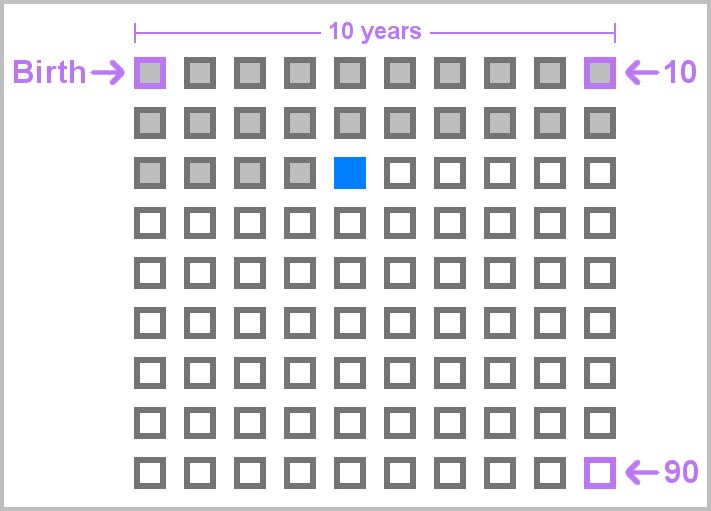
As of March 13, 2016
What are we looking at? This is a human life in years. A relatively long human life in years actually. My life in years to be specific. My life if I make it all the way to 90 to be even more specific.
Each box is a year. Each row is a decade. The blue box is where I’m at today. The gray boxes are years already lived. Time already spent. The white boxes are the years ahead. Time not yet scheduled. Time available for me to shape however I want. Dreams realized. People loved. Adventure. Fulfillment. Happiness. Struggle. That’s what the white boxes represent.
And that’s my life. My entire life. Birth to death in just a few boxes.
Where’s your blue box at? Are you satisfied with how you’ve spent your gray boxes? What do you plan to do with the white boxes you have left?
A life in years is an interesting conversation, but we’re not here to talk about life in years. Let’s keep going!
My life in months
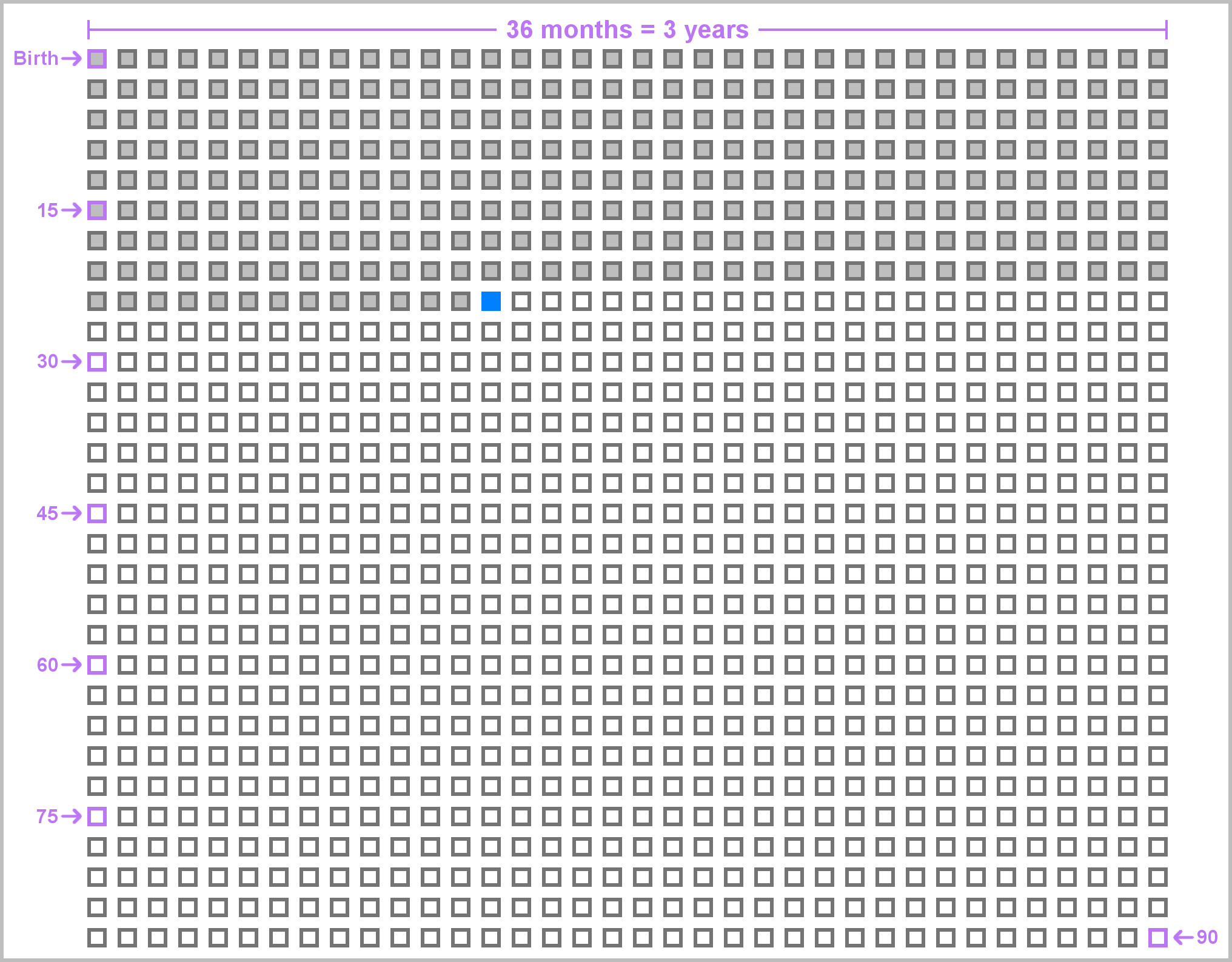
As of March 13, 2016
This is my life in months. Each box is a month. Each row is three years. That blue box? That’s me! Same as before.
Kinda scary, right? If you live to be 90-years-old, then these are all the months you get. It doesn’t look like much does it?
Each box is precious. Obviously each box is precious. Intuitively, we know that our lives, our months, are precious. We’re given so few to work with that each and every one should be cherished. We know this, and yet somehow, we forget this. Constantly we forget this.
I do this too. I try to be intentional with how I spend my time yet somehow life just kind of drifts into autopilot. For instance, it’s crazy to me that we’re already in April. Winter is over and spring is here. It feels like Christmas was three weeks ago, not three months ago! Where did those months go?
What have you accomplished so far this year? What are you proud to have done? We’re three months into 2016. Three more gray boxes added to your life. Three more white boxes removed. Were they worth it?
But again, while a life in months is fun to talk about, we’re not here to talk about life in months. We need to go deeper.
My life in weeks
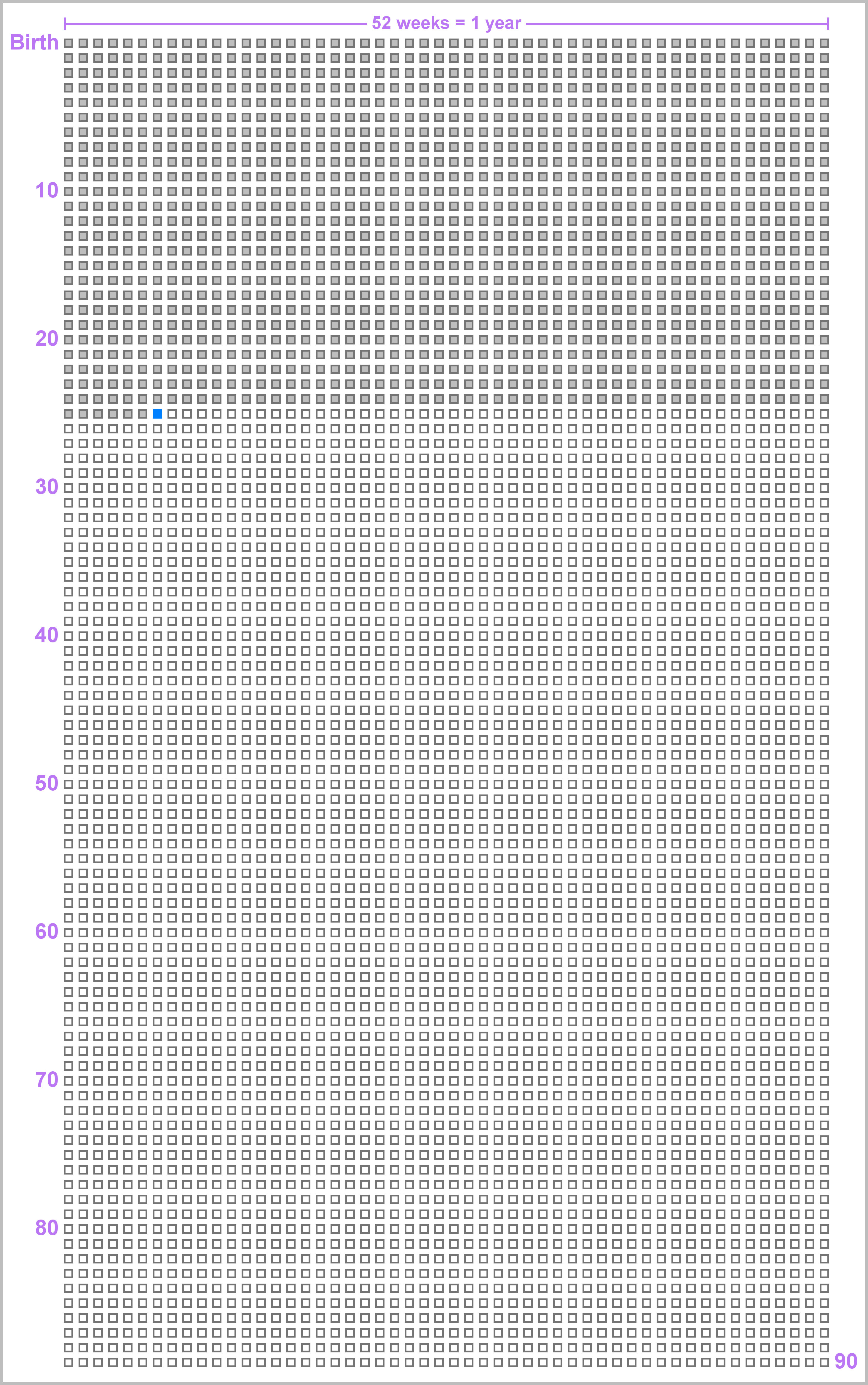
As of March 13, 2016
This is it! This is why we’re all here! This is my life in weeks.
Each box is one week. Each row is one year. All the way to 90. The blue box is me. The gray boxes are weeks I’ll never get back. The white boxes are weeks I have every intention of cherishing.
This is the part where the length of a human life suddenly stops feeling like a long time.
So, why weeks? Why is it important to visualize our lives this way?
A year is too big of a unit of time to measure ageing with any kind of understanding. Too much can happen in a year. It’s hard to plan for a year. It’s hard to evaluate how successful a year was or wasn’t. We all know what a year is, according to the calendar at least we do (12 months, 52 weeks, 365 days, etc.), but we really don’t know how long a year feels.
And how could we? We experience so few of them passing during our lives. Even if you could track how long a particular year felt, it would most certainly feel different when compared to the year preceding or succeeding it. Years are fluid. Our perception of them is imprecise. They’re too unknown.
Knowing all that, telling someone they have 65 years left to live doesn’t mean much. At least, it doesn’t mean much to me when I’m trying to understand the length of my own life. It’s a similar story when talking about months. But weeks are different.
Weeks are more quantifiable. Everything I said I couldn’t do with a year, I feel like I can do with a week. I can plan for a week. I can easily evaluate whether a week was successful or not. When a week ends, I can think back on it, on all of it, and know exactly what I did or didn’t accomplish. A week is small enough, and I encounter them frequently enough, that I feel like I have a strong understanding of what a week is. What it really is. Beyond the calendar. What a week feels like. And sure, some weeks feel longer or shorter than others, but the variations in time difference are tiny compared to the variations experienced between months or years.
Weeks make for more meaningful visualizations because weeks are a smaller and more easily understood unit of time. At least when compared to years they are (which is how we commonly talk to each other about human lifespans).
Pretend I’m talking to someone about Tesla’s market cap–$30 billion. We’ve all heard huge sums of money like this thrown around before, but what even is a billion dollars? I don’t know. Do you? I’ve never been anywhere near a billion dollars. I’ve never been anywhere near a billion anything of note. A billion is too big and too foreign for me to understand it.
What if instead someone told me Tesla’s market cap was $30,000 million? Would that help my understanding? Not really. A million is still too big and too foreign, and I still have little frame of reference for what a million of something is.
If I really wanted to understand Tesla’s market cap, understand it as something more than just a number, then the units it’s measured in need to be something I understand. Something like my paycheck.
Pretend I make $10,000 every two weeks (I wish). If someone then told me Tesla’s market cap was equivalent to 3 million of my paychecks, equivalent to me working for more than 115,000 years at my current salary, then the enormous amount of money Tesla is worth starts to make more sense. It starts to become more than just a number.
The more easily understood the unit of measurement, the better understood the thing being measured. So, to better understand the thing being measured (a human life), we need to use an easily understood unit of measurement (weeks).
A week is a small unit of time, but a lifetime of weeks is still totally countable. 90 years? That’s 4680 weeks. You could print all your weeks on a single sheet of paper.
Take a second to scroll back up to the previous image. Zoom out if you have to to fit the whole image on your screen. That’s an entire human life at a glance. It’s my life. It’s your life. It’s everyone’s life. Everyone you love and care about. Everyone you’ve ever met. Everyone you have yet to meet. Your parents. Your children. Your future spouse. These boxes are all any of us ever get. And many of us won’t even get this many. It’s a powerful image, right?
It’s so easy to waste a week. So easy to let one or two or three slip through our fingers without a thought. That important project you meant to get started on? It can wait. What’s one more week? That job you’re indifferent to? At least the money’s good. And the benefits are nice. “I like it enough,” you tell yourself. “I’ll pursue something more exciting when I’m more financially stable,” you say. It’s supposed to be temporary. “Just for a year.” But a year comes and goes. And then another. That’s two years now. 104 weeks. 104 of your boxes–two rows of your life–grayed out. You don’t get new boxes.
We waste weeks (intentionally or unintentionally) because an individual week seems expendable. They seem like an infinite resource. They seem like they’ll never run out. But they do run out. They will run out. The weeks we have are limited. They’re finite. They’re countable. Painfully, painfully countable.
So what are you going to do this week to make it a worthwhile one? One that you’re proud to have lived? Proud to have included on your life calendar? At the end of your life, when you look back at all your gray boxes, won’t it be nice to know that you did everything possible to make each and every one well lived?
My life in weeks to 76
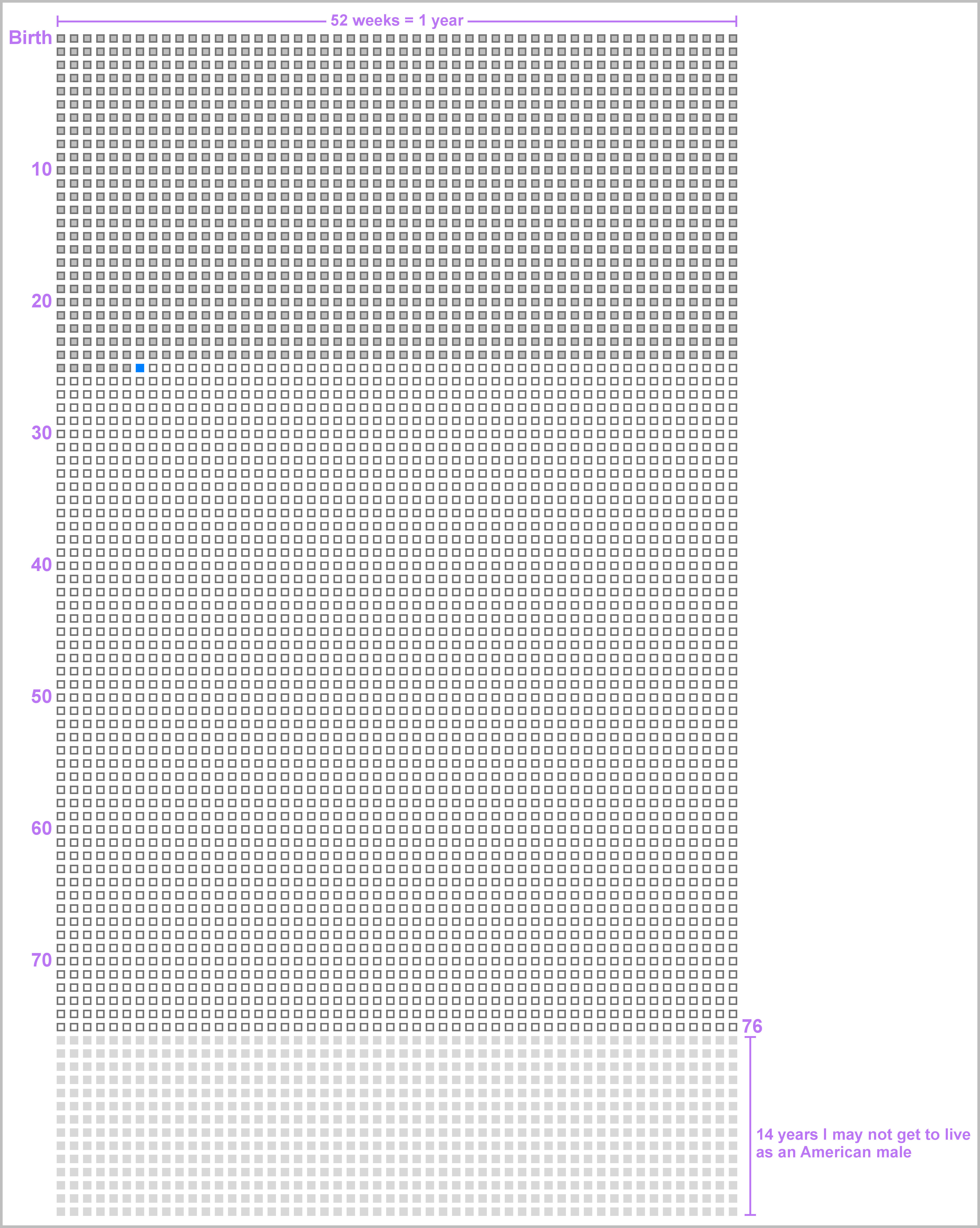
As of March 13, 2016
Remember how I said a 90-year lifespan was optimistic? I wasn’t kidding. According to the World Health Organization, as of 2013, the average life expectancy for a male living in the U.S. wasn’t 90 years, it was 76 years.
14 years not lived. 168 months not cherished. 728 weeks, 728 precious white boxes, gone. Poof.
My life in weeks to 46
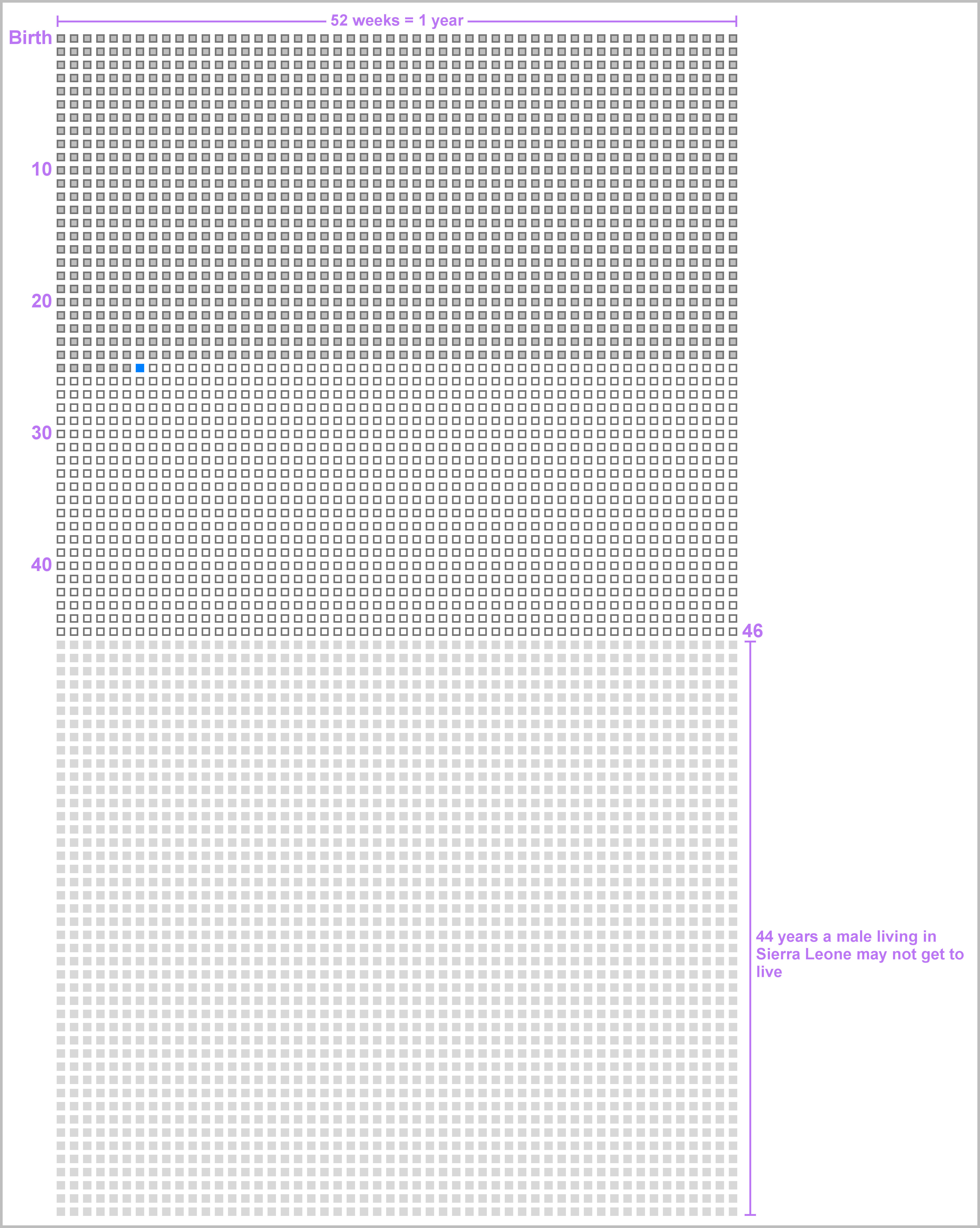
As of March 13, 2016
And making it all the way to 76 would be considered a miracle in some parts of the world. In Sierra Leone for instance, the average male life expectancy is only 46 years. 46 years! That’s 30 years fewer then what I’m expected to live as a resident of the U.S.
Me dying at 46 isn’t fun to imagine, but my death would only be part of the story. I would die young sure, but then (most likely) so would everyone I love and care about. As a 25-year-old, my parents would probably already be dead. Both of them, which means they would never get the chance to meet their grandchildren should I or any of my siblings choose to have kids. And since my mom was 31 when I was born, I probably would’ve never been able to meet my own grandparents. Aunts and uncles? Dead mostly. At 25, I’d already be more than 50% through my life. More than half of all my boxes would be gray.
It’s easy to complain that the U.S. is lacking when it comes to the life expectancies of its people (ranked 34th overall as of 2013), but when stacked up next to countries like Sierre Leone, it’s hard to feel anything but grateful. I hope I live until 90, but if I only make it to 76, then I’ll still have lasted longer than so many.
My family’s lives in weeks
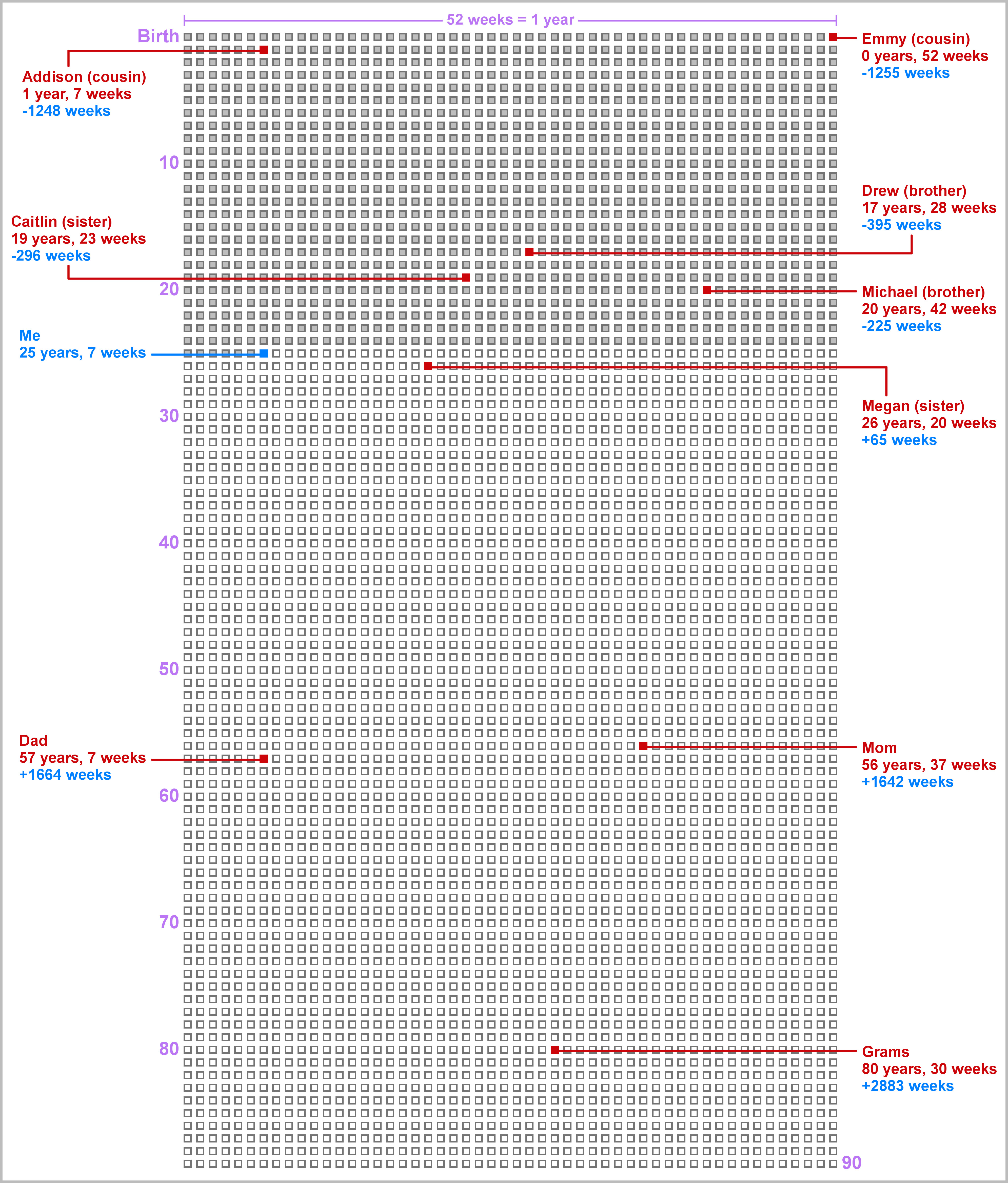
As of March 13, 2016
And now my family joins us! How are you guys? I miss you. I hope you don’t mind that I’ve dragged you into my quarter-life crisis. Do you want anything to drink? Glass of water maybe? No? Are you sure? I use a filter. Alright then. I guess just sit back, relax, and enjoy these kinda-scary-but-mostly-interesting-but-actually-mostly-really-scary observations.
Plotting out ages like this is a fun way to view generations. There are three up there now, but it looks like there’s almost room for one more.
Speaking of generations, 1241 weeks separate my mom and my grandma. 1577 weeks separate my mom and my older sister Megan. This means when my mom gave birth to her first child, she was 336 weeks older than my grandma was when she did the same. If this trend continues, then I’ll be 1913 weeks old before I have my first kid. That’s 606 weeks from now. That’s 11 years from now. I’ll almost be 37! I’m closer to 8th grade graduation than I am to turning 37.
My parents spent 460 weeks having kids–460 weeks separate the births of my older sister Megan and my youngest brother Drew. If my girlfriend and I got pregnant tonight (pregnant in the thought experiment way, not in the “Congratulations on ruining your life!” way), and if we followed the same popping out babies plan as my parents did, then my 5th kid wouldn’t enter the world until I was almost 35. I’d spend more time becoming a father than I spent in high school, college, and graduate school combined.
And speaking of babies and being pregnant, at roughly 39 weeks of being pregnant per kid, my mom spent something like 195 weeks of her life carrying tiny humans inside her. That’s almost 4 rows of her life calendar spent being pregnant!
There’s a big gap between my brother Michael and I. It’s more than twice as big as any other gap between consecutive siblings. Growing up, I wasn’t a big Michael fan. It took me a long time to accept him as the loving brother he is. Prior to him being alive, I spent more than four years as the youngest child. Four years as the dearly beloved baby of the family. And then suddenly I wasn’t anymore. I think any king needs time to adjust to his new ruler after being usurped. But that adjustment process really shouldn’t have taken me nine years.
There’s a huge gap between my youngest cousin Emmy and me. 1255 weeks! On the one hand, it makes my heart flutter seeing all those white boxes ahead of her on her life calendar. So many empty boxes! So much potential! On the other hand, me being 1255 weeks older means my life intersects our grandma’s life 1255 weeks more than Emmy’s life ever will. And this isn’t limited to just our grandma. It’s true for each of our family members older than Emmy. When her parents (my aunt and uncle) die (many, many years from now), I’ll have known them for more years than she has. That doesn’t seem fair, does it?
A similar story can be told for my brother Drew. I’m 395 weeks older than he is, so when our parents die (many, many years from now), I’ll have known them for 395 weeks longer. 395 extra weeks of hearing their voices, of seeking out their advice, of telling them I love them and hearing the same. It seems unfair. It’s a gift I didn’t realize was given to me until recently. Being an older sibling and an older cousin means I get more time to spend with my family. I don’t want to take this time for granted.
And finally, the elephant in the room. My grandma is fast approaching 90. If we talk to each other on the phone every week, then we’ll only share 490 conversations before her 90th birthday. Scary. Even scarier, there are only 9 Christmases between now and her turning 90. If we only see each other once a year when I go back to Omaha for the holidays, then I might only have 9 more chances to physically hug and hold her. 9. That’s a single-digit number. That’s terrifying.
It’s easy to forget because she looks and acts and feels so young, so strong, so full of energy, but most of her boxes are gray now. It’s not a fun reality to face, but after making these images, it’s a fact that’s impossible to ignore. I hope she defies the odds. I hope she lives to be 110. If anyone can, she can. But she might not, and I have to accept that. It’s better to accept it now. Accept it while she still has some rows left on her life calendar. And as long as she has boxes to spend, I want to be in her ear letting her know how much she means to me.
The section about death
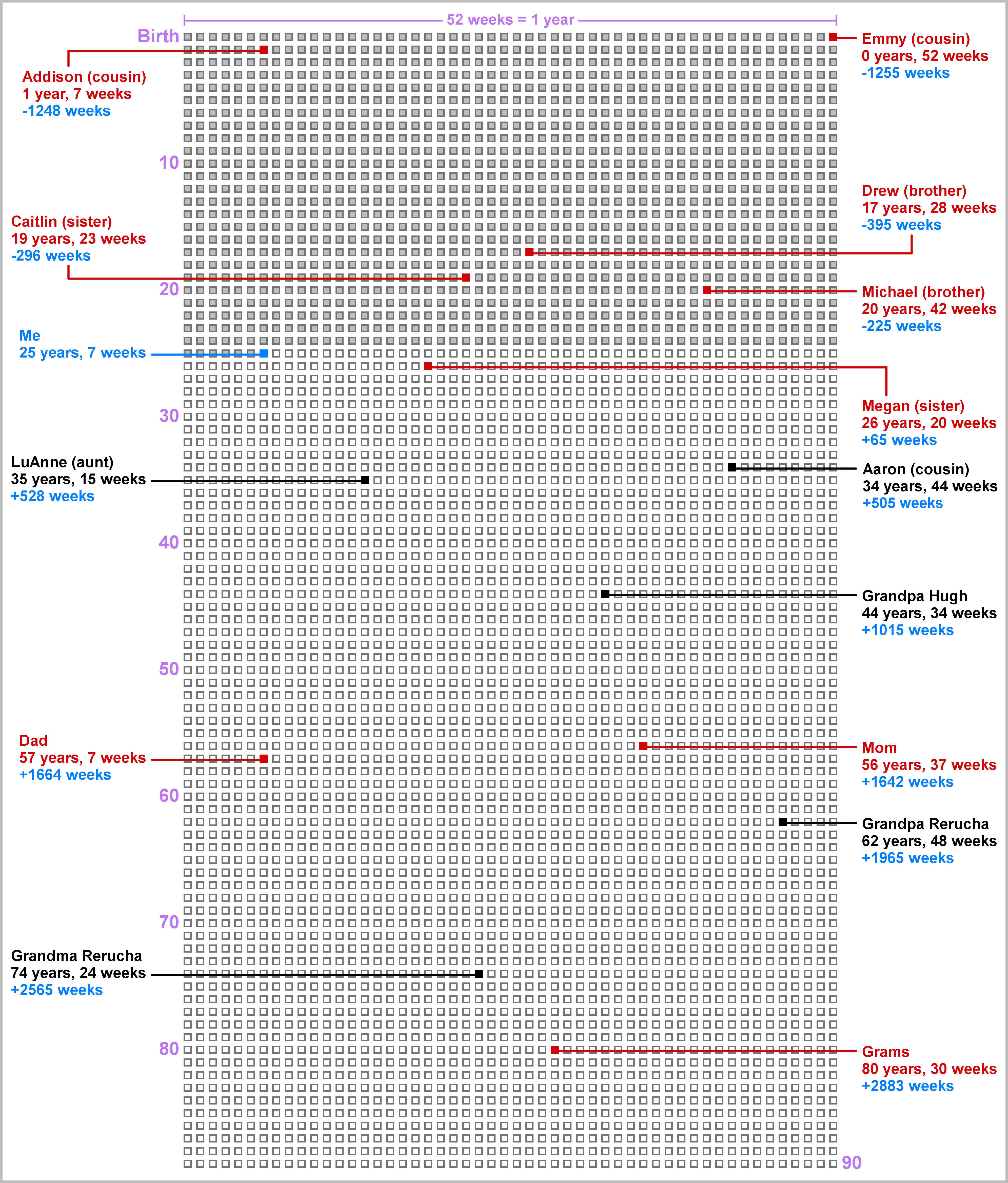
As of March 13, 2016
It’s hard to talk about life without also talking about death. These talks can be uncomfortable–death is almost always a bummer–but honestly, conversations about life are more meaningful with death on the table. Without death, life wouldn’t be life. We wouldn’t be living, we’d just be existing. We’d be like rocks or something. As humans, we grow, we change, we decay, we die. At any moment, death is a possibility. Over the long term, death is an inevitability. It’s what separates us from inorganic matter. It’s what makes life precious–we only get one chance at it.
Maybe one day future scientists will find a cure for ageing, and death will be no more. It’ll exist in seldom read textbooks, and third grade teachers will mention it to their students in passing before moving on to more pleasant topics. People probably won’t think about death as much. They might not think about it all. It’ll be like smallpox to them. Just another unfortunate disease early people had to contend with. “How barbaric,” they’ll remark while pondering living for such a brief period as 90 years. “How did people back then see and experience all the world had to offer?” they’ll wonder. “How did they love and explore and fulfill all their wildest dreams in such a short time?”
When that day comes, a day without death, a life without fear of dying, will we still be human? Will we still be organic? Or will we have evolved into something else? Will life then still be life? Will we appreciate it in similar ways? Big questions far off.
As things exist today, death is inevitable. It’s something we’ll all face. It’s something worth talking about, I think, which is why I made the image above. Each black box represents a death in my family, months of mourning, and years of sorrow. A life cut short. A harsh reminder to appreciate today. Appreciate this moment, whatever this moment holds, wherever you are, whoever you’re with.
The first thing I notice when I look at this calendar is how tragic it is. My cousin died at 34. He was a brother, a son, a husband, a father. My aunt died at 35. She was a sister, a daughter, a wife, and the mother of 2 small children, the oldest only 13-years-old. My grandpa died at 44. He was a husband and the father of 8 children. His oldest, my mom, was only 18 when he died. His youngest, my aunt, only 2. His 8 children grew up and collectively gave birth to 35 children of their own–35 grandchildren my grandpa never got to meet. 35 babies he never got to hold and rock gently to sleep in his arms. 35 chances he never had to observe his own children become loving parents. And you can’t see it on this calendar, but my Grandma Rerucha lost her daughter LuAnne one year and her husband of 37 years the next, just 14 months later. The mourning she felt from the death of her daughter was probably still fresh in her heart when she learned her husband had died too.
Tragic.
Even so, the second thing I notice when I look at this calendar is how lucky I am. I still have both my parents, which my mom didn’t have when she was my age. In fact, I’ve already spent 329 weeks more with my mom than she was able to spend with her dad. That’s something to be thankful for.
And sure my grandma is starting to get old, but getting old is a gift. I wasn’t able to meet my grandpa, but I know my grandma. I know her well. She’s one of the most important people in my life, one of the strongest, kindest, and most selfless, and every week we share is a gift. Every week we have together is a week millions of others, people whose grandmothers are no longer alive, wish they could have. That’s something to be thankful for too.
My dad’s life in milestones
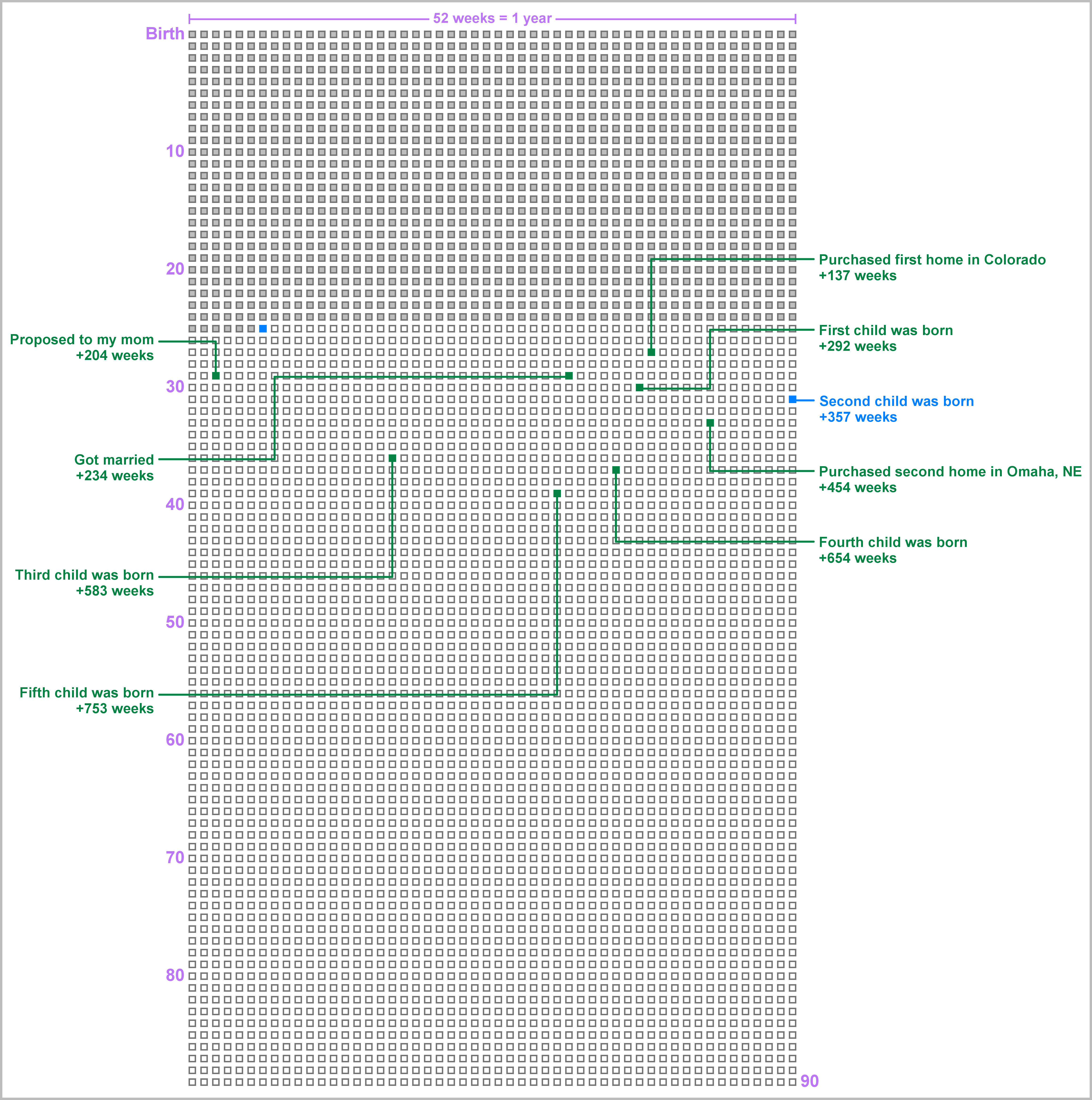
As of March 13, 2016
Switching gears, here are some milestones my dad lived. There’s not too much I want to say here other than to note that if I follow in his footsteps, then a bunch of life-changing events are going to start running at me fast and furious in a few years.
If I have kids, and if I’m the same age when my first child is born as my dad was when his first child was born, then I’m closer to getting my future wife pregnant than I am to starting my sophomore year of college, which is crazy to think about.
Also, Megan, looking at this calendar, it looks like you were conceived the same week as dad’s birthday. Maybe you were a birthday present baby? We should ask mom and dad about it.
My life in categories
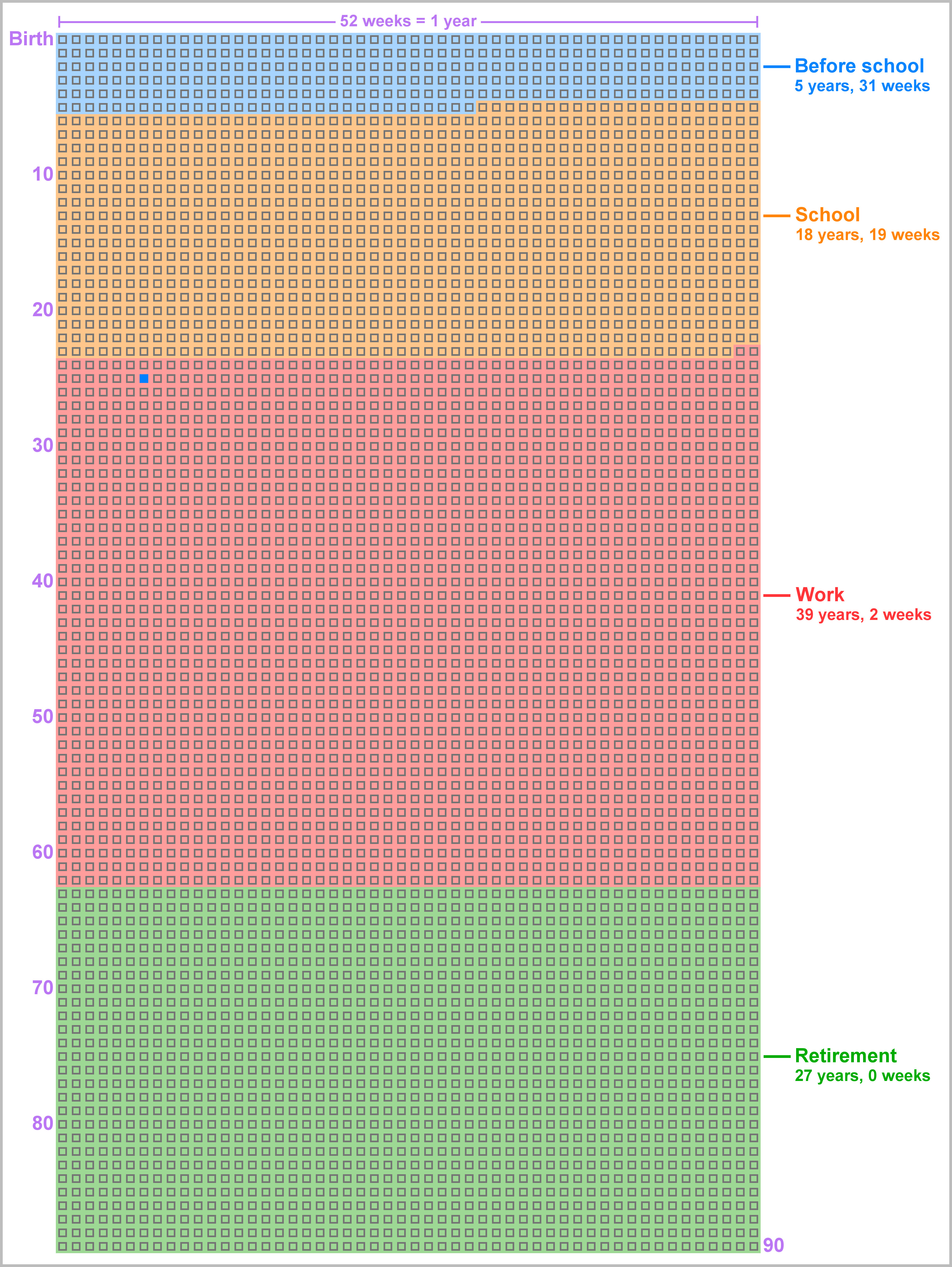
As of March 13, 2016
Switching gears again, this is my life in categories. Four broad, sweeping, color-coded categories. Four categories that most of us probably share.
First up is blue. This represents the time I spent as an infant, a toddler, and a small child. The time I spent at home before starting school. Before kindergarten. Most kids start kindergarten around the same age (five or so in the U.S.), so this part of your life calendar is probably similar to mine.
Next, orange. This represents the time I spent in school. All of it. Kindergarten to master’s degree. 6 years in elementary school, 3 years in middle school, 4 years in high school, 4 years in college, and 1.5 years in grad school. 18.5 years total. That’s a lot of school. Age 5 to 23. Most of my childhood, all of my adolescence, my early years as an adult. All spent in school. I’ll talk some other time about whether or not I think so many years of factory-style education is the most valuable use of a young person’s life.
After orange is red. This represents my working life. This is what I spent all that time in school working toward. You can see from the blue square above that I’ve only just recently started my career. I’m a little over one year at Blue Sky now, and honestly, so far so good! I really enjoy my job. But boy is that work section big. 39 years big. Almost half my entire life calendar big. It’s intimidating. Of course, this assumes I work until I turn 63–the current average age of retirement for workers in the U.S.
And last, green. The time after my working years. When my career and my body are both winding down. This represents the period of my life where my time is truly my own. The period where I’ll no longer have to dedicate parts of my life working to fulfill other people’s goals, not if I don’t want to at least, which is what we’re all asked to do as employees. A good job is one you enjoy. A great job is one where your personal goals and values line up with the goals and values of your company. Even with great jobs though, even with the best jobs, you’ll be asked to make concessions from time to time. Asked to turn your back on your personal goals and values for the benefit of the company. Your paycheck will depend on it.
In retirement, when you’re no longer financially dependent on anyone but yourself, you won’t need to concede your values anymore. You won’t need to prioritize someone else’s goals over your own. You’ll get to spend your time, all of it, precisely how you want. That’s freedom. Why do so many people wait until 63 to claim it?
My life in categories to 76
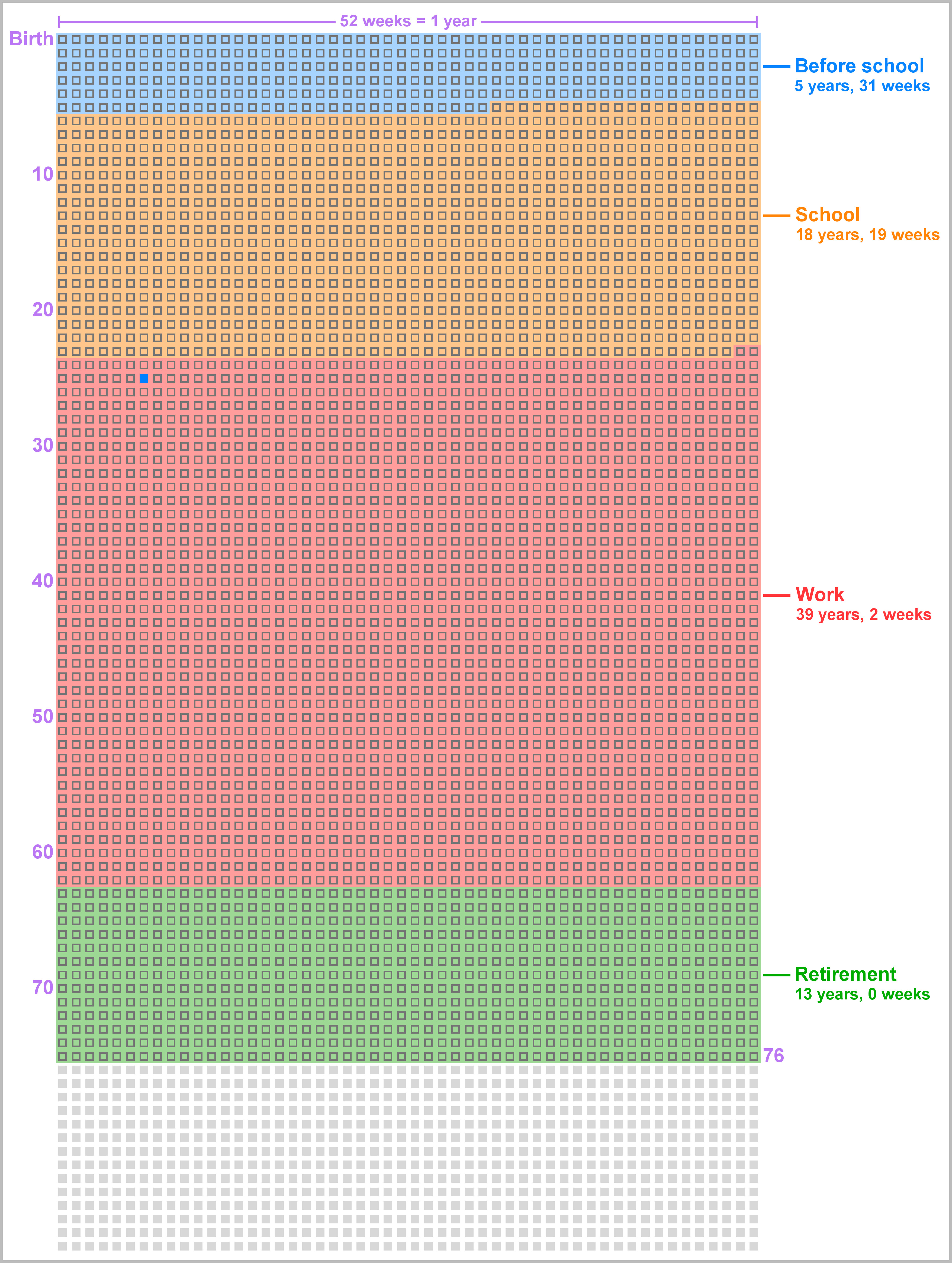
As of March 13, 2016
But of course, as we know by now, a 90-year life is an optimistic one. I probably won’t live 90 years. You probably won’t live 90 years either. Statistically, I’ve got 76 years in me. And at 76 years, the categories above start to look scarier.
That freedom found in retirement I was talking about? Well now half that freedom is gone. 27 years dwindled down to 13. That makes for a working life 3 times longer than retirement, which means spending 3 times as many years working to fulfill other people’s goals instead of my own. Which means giving up 3 years for every 1 year I take for myself. And a year of retirement at the end of life isn’t equal to a year spent working somewhere in the middle. Early years are more valuable. As death nears, my body will deteriorate. When death is close, it’ll hurt to wake up in the mornings and I’ll be too tired to function past 8pm and too scared to travel the world because of incontinence. At this point, I’ll be financially free, sure. I mean, I’ll be retired. I won’t need to work to live anymore. But this isn’t freedom. I won’t be able to live the life I had dreamed for myself. I’ll have waited too long.
We have a bad habit in the U.S. of taking the best years of our lives, years when we’re young and full of energy, years when we’re still brave enough to dream big and take risks, we take those years and we trade them in for a steady job in hopes that we’ll climb the corporate ladder high enough to fund an excessive life now and a lavish retirement 40 years down the line. We defer happiness for decades because that’s how it’s always been done. That’s the American Dream. We spend the best years of our lives working toward a retirement we’ll be too old to fully appreciate once we finally get it.
I don’t like this future, and I don’t want this future. I want something different.
I’m working now, and I’m fortunate because I honestly enjoy my job, I honestly like my coworkers, making movies is fun. But I’m dependent on my job. Completely dependent. If I weren’t working full-time, I couldn’t cover my basic living expenses for more than a few months. I wouldn’t be able to pay my rent. I wouldn’t be able to buy groceries. If I lost my job, I’d have to find another one quickly. If I grow to dislike my job, I can’t easily walk away. I’m bound by financial incentives.
But I have the power to change this. You might too.
It starts with a simple lifestyle. One where I don’t waste my time or my hard-earned money amassing possessions I don’t need. Things that ultimately don’t make me happy. I have no interest in keeping up with the Joneses. I don’t care about white picket fences or fancy cars. I care about reaching financial independence. I care about paying myself first and making sure I’m in control of as many boxes on my life calendar as possible. This means “retiring” as early as possible. Not waiting in line with all the other 62-year-olds waiting to turn 63.
To me, retiring doesn’t mean never working again. Achieving financial independence has nothing to do with becoming rich. It’s about controlling my own time. It’s about building a life where I choose how to spend each and every one of my boxes. I choose. Not my employer. Not my consumption habits. If I still enjoy my job after reaching financial independence, great! I’ll keep working for as long as that’s true. But if at any point something becomes more important to me than my job, a newborn child perhaps, or living abroad for a year, then being financially independent means I’ll always be able to prioritize the things that matter to me the most.
That’s freedom. It doesn’t take a 40-year career to be free.
Work vs. vacation
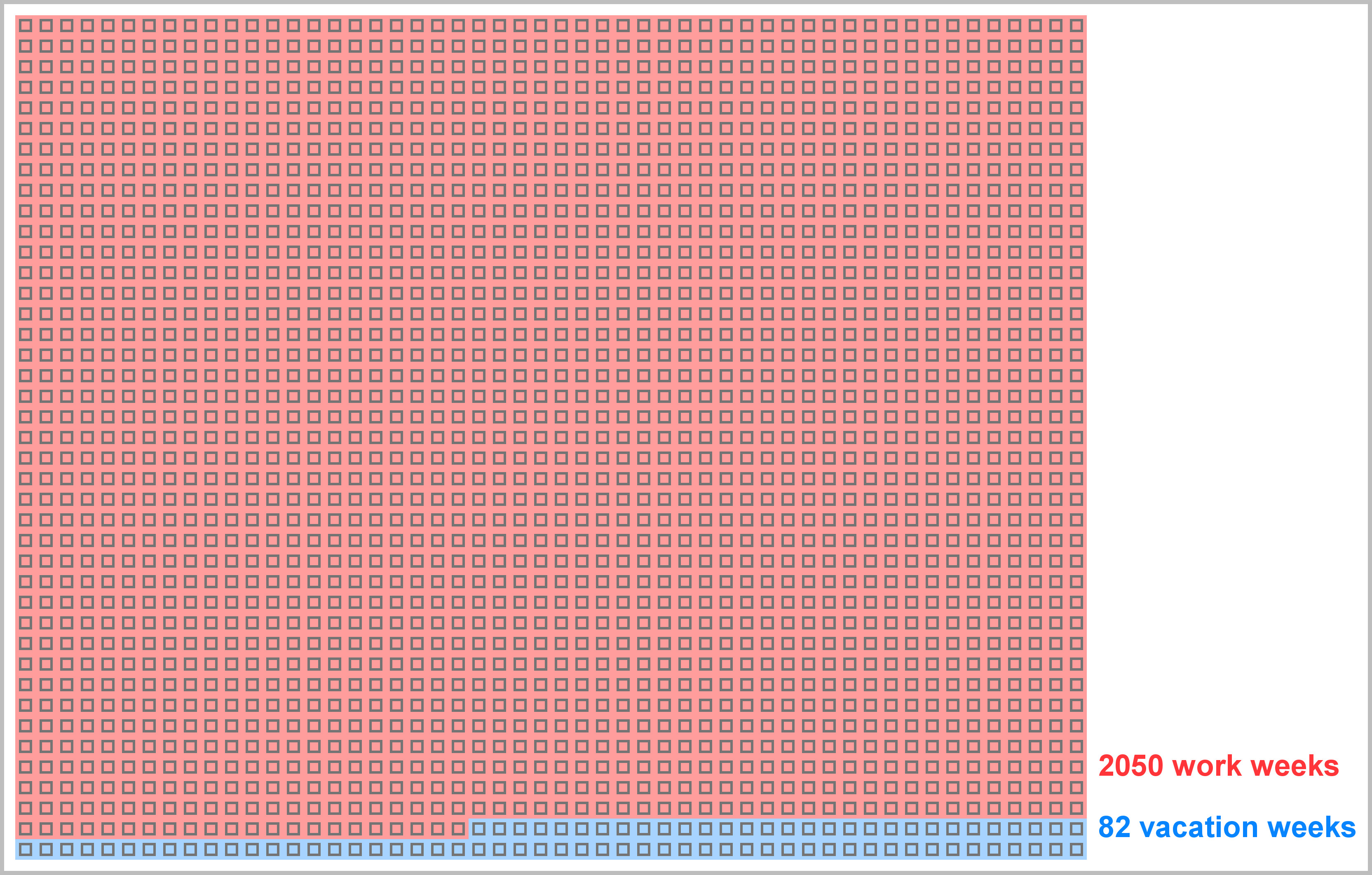
As of March 13, 2016
But if you do decide to take the traditional route, the route where you graduate from college at the age of 22 and immediately jump into the working world at a Fortune 500 company with the standard (but not federally mandated) 2-week paid vacation policy, the route where you work for 41 straight years and retire at the age of 63, this is what your working life will look like.
Every year, you’ll get 52 boxes to spend. And every year you’ll willingly hand 50 of them over to your employer, leaving only 2 for yourself.
I’m living in a two-week vacation world right now, but I don’t want to live the two-week vacation life any longer than I have to. I don’t want this image to become my life.
What does it all mean?
Life is shorter than you think. Your weeks are countable. Be mindful of how you spend your time, be mindful of who you give your time to, because every week is precious.
“What you do today is important because you are exchanging a day of your life for it.”
–Anonymous
Personally, I’m going to print out my weeks, all 4680 of them, and I’m going to hang them up on my wall. A grid of white boxes. A lifetime of possibilities. A constant reminder that the story I get to tell is ultimately a brief one.
At the end of every week, I’m going to review what I’ve done and decide if that week was well lived. If yes, then I’ll color that box blue. No? I’ll color it red. One red box? I’ll try to do better next week. Multiple reds in a row? I need to reflect on my life because something is outta whack.
How will I determine if a week was well lived? Like many others, I maintain lists of my priorities and long-term goals. Constantly evolving lists. On any given week, if I make meaningful progress on any of the items in these lists, then that’s a week I’ll be proud to have lived.
If you’re curious, here’s what my current list of priorities looks like:
- Try new things
- Travel
- Take risks
- Spend quality time with people who bring me joy
- Make sure the people I love know I love them
- Write and publish blog posts
- Practice iOS programming
- Become financially independent
- Minimize my physical possessions
So how did this week turn out? Well, this week I published a blog post. It’s the longest post I’ve ever written. The longest thing I’ve ever posted publicly. It took me more than a month to finish it. And that month ended up being a time of valuable self reflection for me. And? I’m proud of how it turned out. Really proud. Writing it makes me proud of this week.
“How we spend our days is, of course, how we spend our lives.”
–Annie Dillard
Anyway, this is the stuff I was thinking about on my 25th birthday. What did your quarter-life crisis look like?
Cheers.
***
Image credit: Ng





What software did you use to make this?
Hey Steve,
I wrote a Python script that tells me how many boxes should be filled in between two dates, but the images themselves aren’t dynamic at all. I made them by hand in Gimp. I tried to take as many shortcuts as I could within the image editing software, but at the end of the day, the process was super tedious.
I’d love to make a programmatic version in the future that runs all the calculations and also handles all the image generation, but I don’t have anything like that to share just yet.